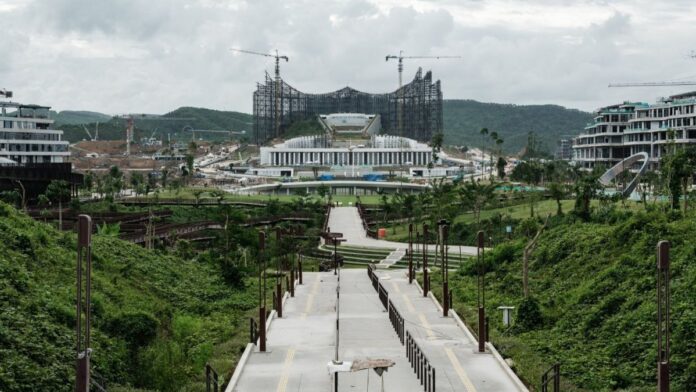Towards IKN as a Technology-Based City in the Era of Prabowo-Gibran Leadership
By Ariani Yudhistira )*
The Indonesian Capital City (IKN) is a symbol of Indonesia’s transformation towards a sustainable and technology-based future. In the era of Prabowo Subianto and Gibran Rakabuming Raka’s leadership, the vision of IKN as a technology-based global city is increasingly real with support from various parties, both domestic and international. The government, through strategic cooperation with partner countries such as Canada and the United States, is trying to realize the concept of a smart city that is integrated, environmentally friendly, and supported by advanced technology.
Indonesia-Canada bilateral cooperation is one of the important steps in accelerating the development of the IKN. The Head of the Indonesian Capital Authority (OIKN), Basuki Hadimuljono, emphasized the importance of Canada’s role in providing technology and sustainability solutions for the development of the IKN. This collaboration involves Canada’s experience in digital technology, smart city solutions, and sustainability systems that are in line with the IKN vision. With this support, the IKN is expected to become a model for an innovative future city, not only for Indonesia but also as a global inspiration.
International support also came from the United States through the United States Trade and Development Agency (USTDA). Deputy for Green and Digital Transformation of OIKN, Mohammed Ali Berawi, explained that the construction of the Integrated Command and Control Center (ICCC) in IKN is one form of this collaboration. ICCC will be an integrated command center that utilizes smart city technology to improve efficiency and quality of life for the community. With the largest grant from USTDA, this project involves seven United States companies that will implement advanced technology in IKN. This step shows that IKN is not only a technology-based city, but also a symbol of strong international cooperation.
The development of the IKN is also supported by research and innovation led by the National Research and Innovation Agency (BRIN). The Head of the Electronics and Informatics Research Organization of BRIN, Budi Prawara, highlighted the importance of autonomous electric vehicle research in supporting the smart city concept in the IKN. Autonomous electric vehicles not only help create a smart, zero-emission transportation system, but also support the development of technology-based creative industries in Indonesia. By integrating internet of things (IoT), artificial intelligence (AI), and mechatronics technologies, the IKN is committed to utilizing modern technology to increase efficiency and competitiveness at the global level.
The concept of a smart city in the IKN also covers various aspects of life, including transportation, infrastructure, energy, and the environment. The Indonesian government plans to implement a zero-emission, shared vehicle-based, and autonomous transportation system, which will be the backbone of mobility in the IKN. With the support of AI and big data technology, this transportation system is expected to be able to create high efficiency and a better user experience. In addition, intelligent mechatronics will be a key element in ensuring that all systems in the IKN can adapt to global technological developments.
The transformation of the IKN into a technology-based city not only provides benefits for Indonesia, but also opens up great opportunities for international partners to invest and collaborate. Canada, with its extensive experience in sustainable technology solutions, can be a strategic partner to accelerate the implementation of the smart city concept in the IKN. Meanwhile, the involvement of the United States through USTDA shows that the IKN has global appeal as a center for innovation and technology.
The vision of IKN as a smart city is also in line with the industrial revolution 5.0, where technology integration is the main key. In this context, the development of AI, big data, and intelligent mechatronics play an important role in creating a more efficient, adaptive, and sustainable system. IKN is expected to become a living lab that allows testing and implementation of the latest technologies to support sustainable development.
Prabowo-Gibran’s leadership has a strong commitment to making the IKN a symbol of Indonesia’s technological progress. With the support of visionary policies and strategic collaboration with various parties, the IKN is expected to be able to become a city of the future that is not only modern, but also inclusive and environmentally conscious. This transformation not only reflects Indonesia’s ambition to become a major player on the global stage, but also shows the determination of this nation to create a better future for future generations.
IKN as a technology-based city will be a catalyst for technological development in Indonesia. By utilizing local research and innovation potential, as well as support from international partners, IKN is expected to be a successful example of how technology can be used to improve people’s quality of life. In addition, this transformation will also encourage economic growth through the creation of new jobs, increased competitiveness, and the development of technology-based creative industries.
Towards a new era under the leadership of Prabowo-Gibran, the IKN becomes a symbol of hope and pride for the nation. With a clear vision and close collaboration between the government, society, and international partners, the IKN will be real evidence that Indonesia is able to lead in the era of technology and sustainability. This transformation is not only about physical development, but also about building Indonesia’s identity and future as a developed country with global competitiveness.
)* the author is an urban planning observer
